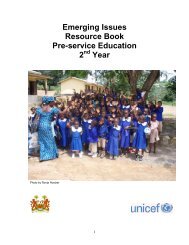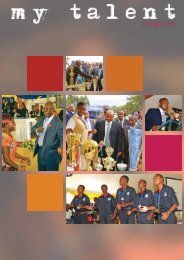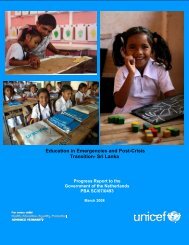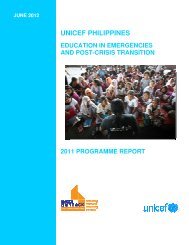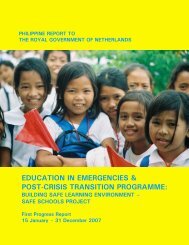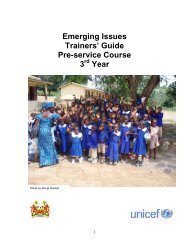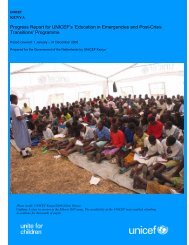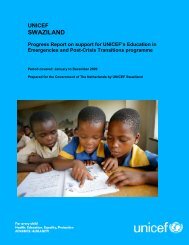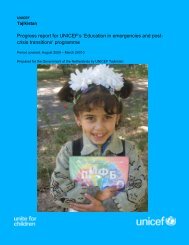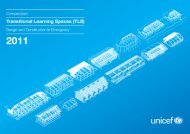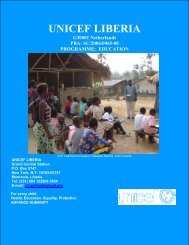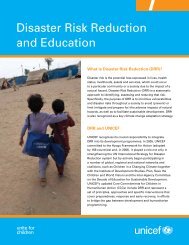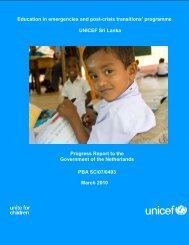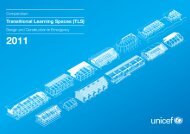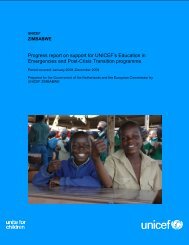Disaster Risk Reduction in School Curricula: Case Studies ... - Unicef
Disaster Risk Reduction in School Curricula: Case Studies ... - Unicef
Disaster Risk Reduction in School Curricula: Case Studies ... - Unicef
You also want an ePaper? Increase the reach of your titles
YUMPU automatically turns print PDFs into web optimized ePapers that Google loves.
173<br />
Middle East and North Africa<br />
Children participate <strong>in</strong> a group activity<br />
dur<strong>in</strong>g a life-skills peer education<br />
session <strong>in</strong> Abu Tig <strong>in</strong> Egypt.<br />
© UNICEF/NYHQ2011-1605/LeMoyne<br />
students and the community at large. The curricula also seek<br />
to develop and empower students’ life skills so they can cope<br />
with different aspects of disasters and crises, whether natural<br />
or human-<strong>in</strong>duced.<br />
The curricula also <strong>in</strong>clude def<strong>in</strong>itions of disasters, disaster<br />
management phases, and traditional and non-traditional<br />
methods of treatments and solutions. They aim to develop<br />
knowledge, attitude, skills and behaviour through active<br />
learn<strong>in</strong>g and practices. The focus is primarily on earthquakes,<br />
floods, fire, desertification, and road and railways accidents.<br />
In the new basic education curricula (grades 1- 9), DRR is<br />
covered <strong>in</strong> terms of knowledge and conceptual development<br />
through different subjects: Science, History, Arabic, Social<br />
<strong>Studies</strong> and Islamic Education. Several aspects of DRR are<br />
covered by these subjects: security precautions and safety <strong>in</strong><br />
the case of earthquakes and volcanoes, preventive measures,<br />
plann<strong>in</strong>g for a crisis, management, procedures to overcome<br />
a crisis, preventive measures to reduce environmental risks,<br />
deforestation, floods, excessive use of pesticides, air pollution,<br />
natural reserves, clean energy, <strong>in</strong>dustrial waste, pollution,<br />
non-renewable energy, drought, attrition, earthquakes, volcanoes,<br />
hurricanes, water erosion (fluvial and mar<strong>in</strong>e), conflicts and<br />
wars, decl<strong>in</strong><strong>in</strong>g health and social services, high population<br />
density, high illiteracy rates.<br />
Secondary education (grades 10-12) curricula are still under<br />
development although they conta<strong>in</strong> several manifestations of<br />
DRR <strong>in</strong> subjects such as Environment and Geology, Geography<br />
and History. The follow<strong>in</strong>g are some of aspects of DRR that<br />
are addressed: natural hazards, drought, desertification, floods,<br />
hurricanes and storms, earthquakes and volcanoes, locusts,<br />
<strong>in</strong>sects, air pollution, water pollution, soil contam<strong>in</strong>ation, population<br />
<strong>in</strong>crease, illegal Immigration, pollution of the environment,<br />
deterioration of lakes, deforestation and mar<strong>in</strong>e pollution.<br />
Pedagogy<br />
In spite of the changes <strong>in</strong> the content of primary textbooks<br />
with <strong>in</strong>troduction of new curricula, the ways <strong>in</strong> which knowledge<br />
and related student activities are presented are still traditional.<br />
They rema<strong>in</strong> teacher dependent (Centre for Curriculum and<br />
Instructional Materials Development Centre, M<strong>in</strong>istry of<br />
Education, 2011)<br />
Teach<strong>in</strong>g methods at the secondary level are even more<br />
traditional. Students ma<strong>in</strong>ly focus on knowledge acquisition<br />
and retention for high scores to go to University. Therefore<br />
DRR doma<strong>in</strong>s and the other local and global issues <strong>in</strong>cluded<br />
<strong>in</strong> the secondary school curricula are tightly taught at the<br />
knowledge level, ignor<strong>in</strong>g the psychomotor (skills) and affective<br />
(<strong>in</strong>terests, attitudes) doma<strong>in</strong>s.<br />
Student activities are carried out ma<strong>in</strong>ly <strong>in</strong> schools through<br />
open discussion dur<strong>in</strong>g lessons, communication channels<br />
directed by the teacher <strong>in</strong> search of suggestions and solutions.<br />
Some activities require searches on the <strong>in</strong>ternet (e.g., searches<br />
for the consequences of <strong>in</strong>dustrial pollution). This means that<br />
teacher is the hub of the learn<strong>in</strong>g process. This may be due to<br />
the lack of teacher tra<strong>in</strong><strong>in</strong>g programmes <strong>in</strong> psychomotor and<br />
affective doma<strong>in</strong>s.<br />
Learn<strong>in</strong>g may be more active <strong>in</strong> some private schools. For<br />
example, a celebration of the International Day for <strong>Disaster</strong><br />
104<br />
The National Reform Plan for Pre-University Education, 2007/8-2011/12,<br />
www.moe.gov.eg<br />
105<br />
IDSC (the Cab<strong>in</strong>et, Information and Decision Support Centre. (2011).<br />
Egypt Statement made at the Global Platform for <strong>Disaster</strong> <strong>Risk</strong> <strong>Reduction</strong>.<br />
www.preventionweb.net/english/professional/policies/<br />
<strong>Disaster</strong> <strong>Risk</strong> <strong>Reduction</strong> <strong>in</strong> <strong>School</strong> <strong>Curricula</strong>: <strong>Case</strong> <strong>Studies</strong> from Thirty Countries



